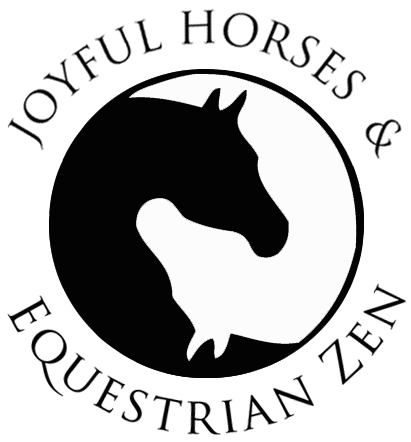Studies show that 90% of performance horses & weanlings have gastric ulcers. Most horses that live with chronic ulcers only show their pain as nervous habits or frequent colic episodes. In their training programs they may get labeled as “grumpy”, “silly”, “uncooperative”, “out-of-control”, “crazy”, “stupid thoroughbred”.
When you start looking for physical reasons that a horse misbehaves, you can solve many behavior problems without resorting to force (punishing a horse can cause the horse to hide their expressions of discomfort but not actually solve your underlying issue). You might find a horse pawing when you take them to the tack area as they begin to associate their tack with pain. Horses with a high acid content in their gut can be very uncomfortable running, jumping, being saddled (“girthy”). And horses with chronic pain from physical injuries can develop ulcers from stress and the regular use of NSAIDS and other pain medications.
So for the sake of your horse and your own safety, let’s start assuming that any horse in your care either has ulcers or might develop them. Scoping horses is what has traditionally been done to check horses, however it’s an invasive, stressful and expensive process. For hind gut ulcers, it’s possible for some vets to do a fecal test, but it can sometimes show a false negative, so most of the time it’s more effective to treat for ulcers and use that money you would spend on testing on a month of Gastroguard/Ulcerguard treatment (Omeprazole & Ranitidine) and good quality probiotics.
One of the hardest thing for horse owners to realize is that the way horses are typically fed can actually cause ulcers. Horses need to eat small amounts of forage all day & all night. Most horses don’t have the option of grazing 24/7, and are only fed once or twice a day. On top of that, many horses considered “hard keepets” are fed large amounts of commercial horse feeds that have sugars, corn, and other high starch ingredients that cause acid buildup in the intestines (which in turn causes ulceration of the mucosal lining). Ulcers can decrease the amount of nutrients a horse absorbs, so healing the ulcers can result in needing less concentrated feeds.
The importance of keeping roughage constantly available to your horse cannot be overstated. Empty stomachs and stress cause acid buildup & ulcerations. Horses with gastric or intestinal pain often don’t want to eat, and they often act “colicky” which can result in calling a local vet who will put a gastric tube down the horse’s nose to fill the horse’s stomach with mineral oil, as well as doing a rectal examine on your horse. And Banamine/Fluxamine is given which can make ulcers worse despite the initial pain relief that it gives the horse. So changing your horse’s feeding program to address your horse’s gut health can decrease your vet visits and reduce the stress on your horse and yourself.
Many people say they can’t give their horses free access to hay or grass because their horse is an “easy keeper” who “gets fat on air”. Often horses who have limited access to roughage end up having signs of insulin resistance, and in fact their bodies think the horse is starving so they put all their resources into storing energy as fat. Another trigger for this starvation mode is if the horse’s teeth have been over filed or there’s another issue preventing adequate mastication (such as old horses losing their teeth). In these cases, tubs of wet Timothy cubes with a little alfalfa can help the horses eat slowly for hours, making sure they get adequate hydration to prevent impaction, without adding extra weight to an already stressed system.
If your “easy keeper” horse is still able to eat hay (check that there’s no clearly identifiable hay particles in their manure), you can soak the hay to reduce sugars as well as feed it in slow feed hay nets or bags. If the horse has time out on pasture, turn them out when the sun goes down & make sure the grass is at least a few inches tall, so the grass is less stressed and making less sugar.
Alfalfa is another piece in healing & preventing ulcers. The calcium in alfalfa buffers the acid in the stomach so feeding a little bit every day can make a big difference to your horse’s well-being. Alfalfa is high in protein, so avoid feeding it in large amounts (2 flakes a day is usually more than enough). Chia seeds can also help the mucosa of the stomach lining. Aloe Vera and papaya enzymes can be used daily in horses with more pronounced ulcer symptoms.
Pain, frustration and boredom can also increase the likelihood of your horse having ulcers, so stall rest and lay-ups are times to work extra hard at keeping your horses occupied with food toys and low stress human interactions. Horses having ulcer flare-ups are often unhappy about being touched around the girth, withers, and back, so grooming may not be a stress-free activity for your horse. Moving your horse into different areas during the day can give them a change of scenery, and playing some simple R+ (positive reinforcement) targeting games can help your horse’s boredom. You can also try using natural supplements such as mint and yucca to help your horse’s discomfort. A slow release magnesium and B12 supplement can also help with soft tissue injuries and tightness.
Making sure your horse can socialize with friends is a must for all horses, stalled or otherwise. Horses are extremely social, their security and general comfort is dependent upon them having consistent friends who will participate in mutual grooming and nap together. This can be especially difficult in boarding stables or with stallions, but realize that the work you put into increasing your horse’s social time (with other equines) will greatly improve your horse’s health, happiness and performance.






